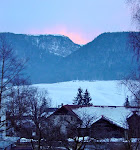
The monastery Bellelay was founded in the early 12th century. Legend has it that in 1136 Siginand, provost of the Moutier-Grandval was hunting wild bore in the area and got lost. He pledged to build a monastery in the case he made it back safely to Moutier. The monastery is the place of origin of the Tête de Moine and has a remarkable history. It is documented to have had an organ in the early 1600s and got a Bossard organ in 1720. The abbaye was occupied in 1797 by French military and has since suffered all kinds of uses, misuses and neglect. The furnishings were sold off. Since the 1960s the sanctuary is being used for exhibitions during summer but in 2008 a replica of the 1720 Bossard organ was inaugurated. I heard it today in a concert by Bernard Heiniger who played some of Bach's well known organ works on this fabulous instrument in this awesome place.
The power and beauty of generic sound, not amplified, by a hand-made instrument and in walls that go back almost 1000 years, is not only impressive. It is pure magic. Siginand, Bach, and Bossard, like other geniuses of all ages, used the means available at their time to make visible and audible the spiritus creator.



